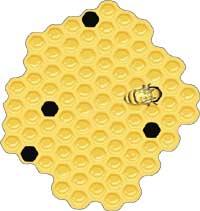Pollen and royal jelly
Both pollen and royal jelly are not considered simple foods, they are food supplements. Pollen is not used as a solo meal, always in combination with other meals, forming a nutritious offer of them. The royal jelly, on the other hand, is taken alone, aside from the food.

Pollen is very nutritious and has all the basic ingredients. The proteins are 35% in weight and are of high value, since they contain all the essences of amino acids. Pollen has a high content of carbohydrates, 50%. The fats, on the other hand, are only 5% and the most unsaturated. All products produced by bees are very rich in regulatory substances and contain abundant pollen. Among the mineral salts stand out potassium, calcium, magnesium and phosphorus. Among the vitamins, those of group B, C, E and carotene, which then produces vitamin A.
However, its content in vitamins and mineral salts is reduced, so it is usually used as a dietary supplement and, above all, in special situations of life such as adolescence, pregnancy or stress situations. Pollen is also especially suitable when there are problems with the rule, in cases of anorexia and when it feels weak and decayed. The non-nutritious substances contained in pollen have other properties: facilitate digestion of food, improve mood, etc.
The nutritive composition of the royal jelly produced by the worker bees is very similar to that of pollen, although the experts in the matter affirm that the composition of the royal jelly is very variable. The royal jelly has been much praised lately, perhaps claiming more benefits than enough.
According to experts, pollen and royal jelly that we speak today are very interesting products to enrich our daily diet. However, because of their parity, one cannot be said to be better than the other. Therefore, if we want to meet our needs of vitamins and mineral salts with tranquility, both offer a unique opportunity. It is enough to take them from time to time.





